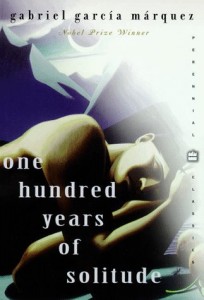Marquez, Gabriel Garcia (1970). One Hundred Years of Solitude. New York: Harper and Row.
It’s difficult to have an opinion about a book that is universally revered as one of the greatest novels of all time, by a Nobel Prize winner who single-handedly created a genre, “magical realism.” But I do. There is a lot to like about this novel, but for me it was tedious: it’s repetitive and goes on far too long.
The time frame of the story really is 100 years, so four or five generations of an ever-branching family move across the pages. Many have confusingly similar names, and the passage of time is not always marked clearly, and kinship relations are always more important to a family than to any outsider, so it is nearly impossible to keep track of the cast. Helpfully, there is a genealogy tree at the front of the book.
The blurring of characters is no mistake. They are partially themselves, but also tokens, standing for Everyman and Everywoman, the parade of humanity over history, particularly, the evolution of Columbian society since its independence from Spain in the early 1800s. Characters who are generations apart act and think much as their forebears did, making the same mistakes, encountering the same joys and tragedies, even while the world around them moves inexorably from an idyllic jungle village to modern complexity. That conveys a kind of fatalism: The more things change, the more they stay the same.
The main attraction of the book is the narrator, a storyteller who has nonjudgmental sympathy for the characters no matter how strangely they behave, yet one who has opinions and observations about them, explaining as if he had been there (which, as omniscient narrator, he was, of course), what was going on and why things developed as they did.
When odd, “magical” things happen, they are reported in the same matter-of-fact tone as the rest of the story. Women fly past a window riding on magic carpets. Seems bizarre, but the narrator explains that they got the carpets from some traveling Arab salesmen who were passing through, and the Arabs always want to trade for macaw parrots, so the flying carpets were a fair exchange. Well, I guess that makes sense! Likewise, when an unwanted priest comes to town, he demonstrates his seriousness by levitating six inches off the ground, impressing everyone. Yet there is a simple explanation. He drinks a big mug of hot chocolate before his performance, and through the power of transmutation of chocolate, is able to levitate. So there you go.
The magical realism component of the book is humorous and very skillfully woven into the fabric of the story, not meant to pop out of the narration. Magical elements arise from situations that inherently support them, such encounters with exotic Arab traders, strange alchemical experiments, gypsy carnivals, memory loss, and so on. It’s a pleasure to watch the author work that theme in ways that keep surprising you.
And then you come across stunningly original sentences that stop you in your tracks: “He had wept in his mother’s womb and he’d been born with his eyes open.” “They were suffocated by the mingled breath of manure and sandals that the crowd exhaled.” Such delights keep the pages turning.
There is much more to praise, but on the down side, it is 500 pages of claustrophobic family drama. There is no plot to speak of, just an endless series of small scenes involving births, deaths, weddings, funerals, sex, suicide, madness, children, parents, food, disease, decay, poverty, wealth, wars, weather, feuds, betrayals, reunions, on and on forever. It is the human story, charmingly written.

